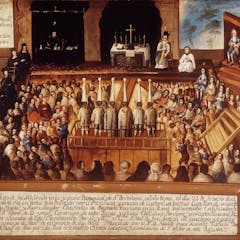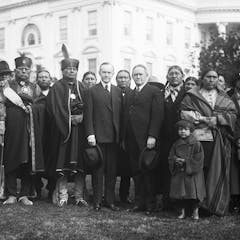
Articles on Indigenous peoples
Displaying 1 - 20 of 303 articles

Conflicts between herders and the wild ancestors of their yaks, camels and reindeer are a serious threat to both people and wildlife, writes a scientist who has seen these clashes firsthand.

A historian of astronomy writes about the role of astronomical events in Indigenous cultures − and also the exploitation of their sacred traditions in present times.

All canoe trips pass through the territories of Indigenous Peoples who are rightsholders to those lands. How can canoers work to account and reconcile for colonialism in Canada?

Billionaires such as Elon Musk and Jeff Bezos are among those most vocal about the benefits of exploring, mining and colonising space.

Indigenous people’s concerns and considerations could provide a strong basis for climate litigation in South Africa.

The Lemba view is that one can be indigenous to more than one place, and that more than one people can be indigenous to a single place.

New research suggests if we can’t eradicate cane toads, we can teach wildlife not to eat them.

Ontario’s Ring of Fire could make Canada a minerals superpower, but Indigenous consultation is essential to ensure doing so does not harm reconciliation or Canada’s global reputation.

There are several reasons why ethical conduct in scientific research is so important.

Conversion was often a violent affair, but that doesn’t mean it was 100% successful. Colonial Latin America was home to many different spiritual traditions from Indigenous, African and Asian cultures.

More than six years after Pavel Sulyandziga, an Indigenous activist from Russia, left the country to seek political asylum in the US, he continues to face harassment by the Russian government.

Rather than have students memorize names and dates, this history curriculum invites students to grapple with real-life issues faced by people from the past.

A scholar of Native American and Indigenous rhetorics writes about the harm done to Native American nations through colonization and what can be done to reduce it.

The origins of the Indigenous People’s Thanksgiving Sunrise Ceremony, held on the traditional lands of the Ohlone people, go back to 1969, a pivotal moment of Indigenous activism.

As detailed in a June 2023 event in Grenoble, France, business schools hold partial responsibility for the longstanding behaviour of multinational corporations (MNCs) in indigenous territories.

The Osage murders of the 1920s are just one episode in nearly two centuries of stealing land and resources from Native Americans. Much of this theft was guided and sanctioned by federal law.

Efforts are being made to develop the capacity of Native tribes to manage bison and bison habitats. An Indigenous scholar explains their sacred significance.

Popular culture often describes scalping − the forceful removing of a person’s scalp − as an indigenous practice. But white settlers accelerated this form of violence against Native Americans.

To the ǀXam and San people, being in the world as a person includes “the sky’s things” - an understanding of and deep connection with the cosmos.

New scientific discoveries are being made by drawing on Indigenous peoples’ ancestral knowledge about medicinal plants.





